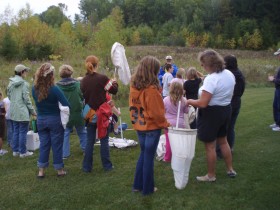 Hikers and runners who exercise at Crossroads at Big Creek often stop by the Collins Learning Center. Our bubbler boasts very cold water and after spending time in the sun, our visitors are thirsty. So are our insects.
Hikers and runners who exercise at Crossroads at Big Creek often stop by the Collins Learning Center. Our bubbler boasts very cold water and after spending time in the sun, our visitors are thirsty. So are our insects.
Take bees. They expend a great deal of energy while foraging. To get hydrated, they have special mouth-parts which form a tube, surrounding a hair-covered tongue shaped much like a spoon.
A bee can extend its tongue more than a quarter inch. By moving the tongue up and down in the mouth-tube, the bee laps up the sweet nectar from a flower. If they are thirsty, bees might dip into a hummingbird feeder or pop can, and really, can you blame them?
Butterflies and moths get thirsty as they flutter about. They have extraordinarily long tongues which they tightly coil when in flight. (It would be awful to get tangled up in one’s one tongue!) When they light on a flower or moisture source, they feel around (and taste) with their feet and when they locate sweet liquid, their tongues reflexively uncoil and act like a soda-straw so the insects can suck up the nectar.
Flies often frequent picnics and human habitations. Their groovy tongues–groovy meaning “having channels”, though they are kind of groovy when you think about it. Anyway, their groovy tongues act like sponges and can absorb all kinds of liquid nutrients.
House flies (yet another invasive species) need to stay hydrated because if they land on solids —think granulated sugar spilled on the counter or crumbs on the table—they must moisten this food by salivating on it. Yes. They spit on food. Once the food dissolves, flies can absorb it with their tongues.
You are familiar with fly specks? These tiny dark stains on windows, walls, and hopefully not tables are fly spit and also fecal material. Because flies eat only liquified food, their meals pass through their digestive systems very quickly and are eliminated. Icky! and potentially dangerous becuase a single fly can carry as many as a million bacteria, though this is more of a problem in disease-prone regions with unsanitary conditions. Here, flies usually are just an annoyance. Still…..
Insects may be annoying, but many are beneficial and all are fascinating. Several of our Family Programs will focus on insects during this, the final week of summer programing. Summer programs designed for learners of all ages are offered Monday through Thursday at 1:30 and are free and open to the public.

